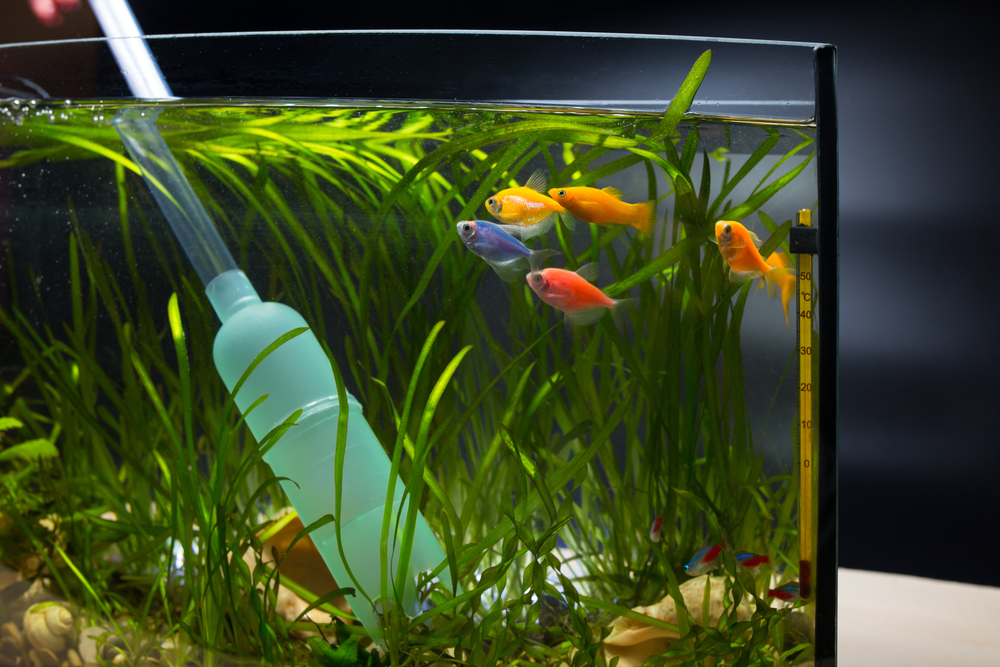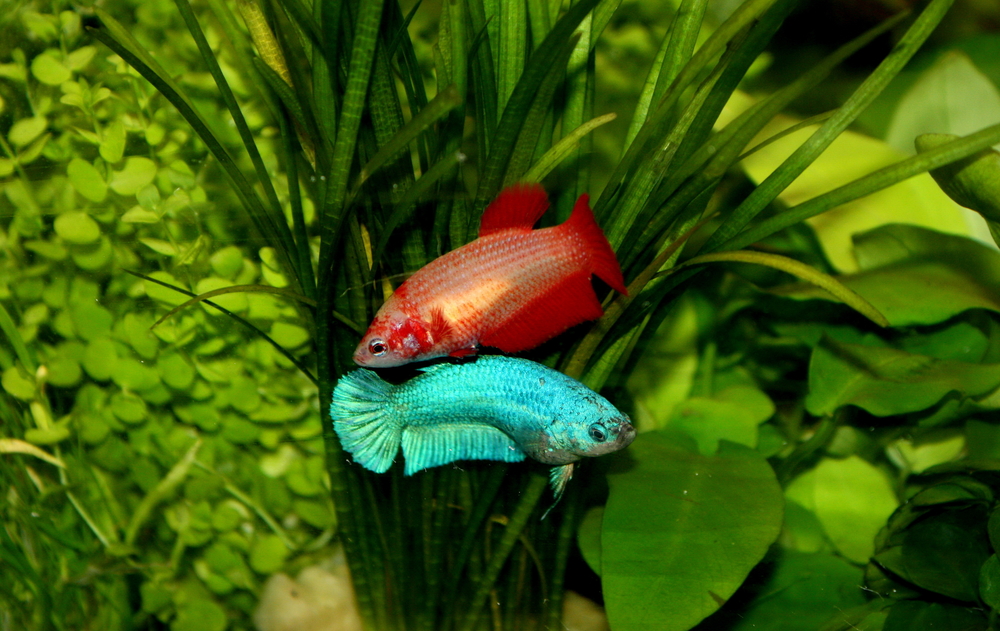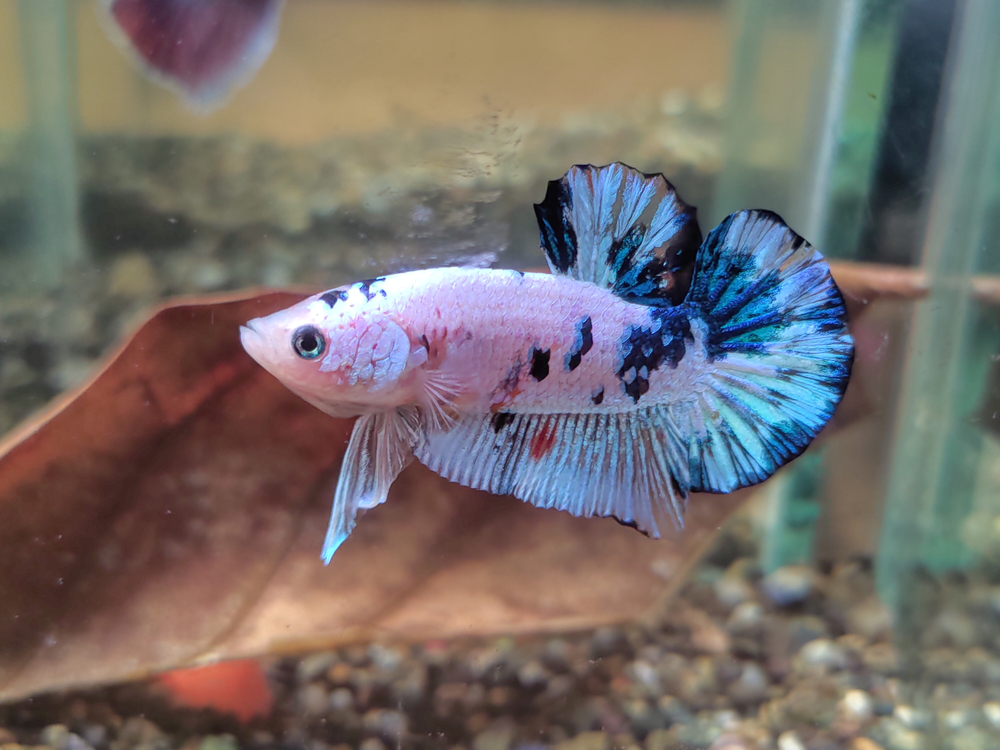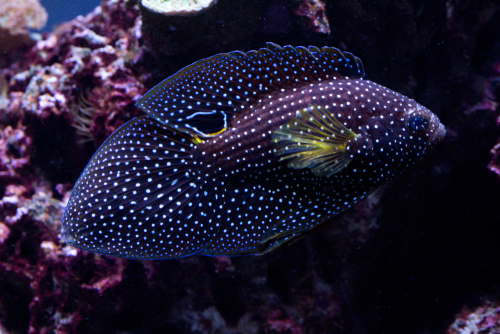When we notice our betta fish refusing to eat, it can be a cause for immediate concern. As an owner, I understand the stress that comes with observing a change in my fish’s behavior, especially when it concerns their eating habits.
It’s important to remember that bettas can have very individual preferences and habits when it comes to feeding. There are numerous reasons behind betta fish not eating, ranging from environmental factors to health issues.
My experience has taught me that pinpointing the cause is key to finding the right solution. Sometimes the problem might be as simple as transitioning to a different diet or as complex as dealing with stress due to tank conditions.
Keeping a close eye on bettas helps notice any changes in its behavior or environment that could be affecting its appetite. It’s also crucial to routinely assess tank conditions and maintain optimal water quality, as poor conditions are frequently a cause for a betta’s decreased appetite.
When a new betta fish is not eating, it’s generally advisable to monitor them closely rather than immediately jumping to conclusions. They may require time to adjust to their new surroundings or might be temporarily disinterested in the type of food being offered.
Consulting a professional becomes essential when the issue persists, as they can provide a thorough examination to rule out or treat any underlying health concerns.
Contents
Key Takeaways on Betta Fish Not Eating
-
- Bettas may stop eating due to environmental factors, dietary changes, or health issues.
-
- Maintaining optimal water quality and observing behavioral changes are crucial.
-
- Professional advice is beneficial if the betta consistently refuses food.
Check out these other most sought posts about bettas:
Understanding Betta Fish Dietary Needs
In considering the dietary habits of betta fish, it is essential to address their carnivorous nature and their preference for high-protein foods. Let’s explore the specifics of what bettas need to thrive.
Natural Diet and Nutrition
In the wild, betta fish diet consists primarily of protein-rich foods.They hunt and consume small insects, larvae, and other zooplankton. Betta fish carnivorous nature means that these live foods provide the necessary nutrients to maintain their health and vitality.
Regular intake of protein is vital, particularly for muscle growth and energy levels.
Common Betta Fish Foods
In an aquarium setting, owners often feed pellets specifically formulated for betta fish. These pellets contain a balance of proteins, vitamins, and minerals designed to mimic Betta fish natural diet. Besides pellets, Betta fish can also be given various types of live food, such as daphnia or bloodworms, which can help stimulate appetite and ensure a nutritious diet.
Additionally, other food options like flakes might be offered, but it’s important to ensure they are dense in protein and not just fillers. Some owners enhance food with garlic, which can boost the immune system and increase the palatability of the food to encourage these picky eaters to thrive.
It is important to serve food in the correct size, as large pieces can be difficult to swallow and may lead to health issues.
Identifying Causes of Decreased Appetite
In my experience caring for betta fish, I’ve learned that a decrease in appetite is often a sign of underlying issues that require immediate attention. I’ll explore the main environmental factors and health-related issues that might cause betta fish to stop eating.
Environmental Factors
Temperature: Betta fish thrive in warm water, with an ideal range being around 74 to 82 degrees Fahrenheit. If the water is too cold, it can lead to a loss of appetite. Conversely, water that’s too warm could also cause stress and decreased appetite.
Water Quality: Poor water quality is a common cause of stress in betta fish. High levels of ammonia, nitrates, and improper pH levels can lead to lethargy and not eating. Ensuring the water is frequently tested and changed is vital for their well-being.
Health and Disease
Disease: A betta displaying symptoms like clamped fins, fading color, or lethargy might be battling an illness such as fin rot or swim bladder disease. These illnesses can cause significant stress and a consequent loss of appetite in betta fish.
Stress: Adapting to a new environment or being housed with incompatible tank mates can stress a betta fish. Continued stress weakens their immune system and could result in illness, making it crucial to monitor their behavior and appetite closely.
Optimizing Aquarium Conditions

In ensuring optimal health for my betta fish, closely monitor and maintain the right conditions within the aquarium. Key aspects include regulating temperature and ensuring water quality.
Temperature and Heating
Water temperature in betta fish’s tank is crucial for its well-being. Bettas require a steady temperature range of 76 to 81 degrees Fahrenheit.
To achieve this, use a reliable heater equipped with a thermometer to enable precise adjustments. It’s essential to avoid fluctuations, as they can stress bettas and lead to health issues. Check the readings daily to ensure they stay within the ideal range.
Water Quality and Filtration
To safeguard the water quality in your betta’s habitat, invest in a robust filtration system that deals with potential toxins like ammonia and nitrate. Regularly perform water changes, introducing clean water treated with a water conditioner to neutralize harmful chemicals.
Use a liquid test kit, specifically the API Master Test Kit, routinely to measure the tank’s water parameters. Keep ammonia levels and nitrate levels low is imperative as even small amounts can be harmful. My maintenance schedule also includes checking pH levels and ensuring tank mates also contribute to a balanced ecosystem.
Maintaining these specific conditions plays a vital role in preventing betta fish from experiencing appetite loss due to stress or discomfort in its environment. Through diligence and care, you can manage an aquarium that promotes the health and happiness of your aquatic companions
Healthcare for Your Betta
Maintaining the health of betta fish involves diligent observation and timely action. It’s crucial to diagnose common diseases early and adopt effective preventive measures and treatments to ensure the well-being of these vibrant fish.
Diagnosing Common Diseases
When betta fish display a lack of appetite, it’s often a sign of an underlying health issue. Take time to observe for other symptoms that indicate a disease, such as ich, which manifests as white spots on the fish’s body.
Another common ailment is velvet, characterized by a rusty or gold dust appearance. Ammonia poisoning is also a critical condition, often indicated by red, inflamed gills, and lethargy.
For parasitic infections, such as ich, look for the telltale white spots and increased gill movement. To confirm ammonia toxicity, test the water for elevated ammonia levels which, if present, necessitate immediate action. Columnaris, another bacterial infection, shows symptoms like white spots, frayed fins, and ulcers.
Preventive Measures and Treatments
My routine in preventing diseases includes maintaining excellent water quality, providing a balanced diet, and ensuring proper tank conditions. I regularly test the water parameters to mitigate problems before they escalate. In case of infections or diseases, I may need to quarantine the sick betta fish, administer medication, or adjust the tank environment.
Ammonia poisoning is preventable with regular water changes and the use of an ammonia detoxifier. For ich or velvet, raising the tank’s temperature and adding aquarium salt can help. If these issues arise, Use medications specifically designed to treat these diseases.
For bolstering betta’s immune system, incorporate vitamins and supplements into their diet. This preventive approach not only strengthens their natural defenses but also reduces the likelihood of illness.
When treatment is necessary, follow the medications’ instructions carefully, adjusting dosages as recommended for the size of your tank and the severity of the disease.
Behavioral Insights and Solutions
When your betta fish ignores its food, it’s not simply being stubborn; it’s a sign that something needs attention. Look for changes in behavior that offer clues to the underlying issues and work towards practical solutions.
Understanding Betta Behavior
Betta fish have complex behaviors influenced by factors like stress, aggression, and territory. Male bettas are notoriously territorial and might display aggression, which is normal to an extent but can escalate to harmful levels if they are stressed.
Female bettas are typically less aggressive, but they can also experience stress. Another consideration is lethargy, which is often misconstrued as laziness but can be an indicator of poor health or an uncomfortable environment.
If a betta is on a hunger strike, it doesn’t necessarily imply sickness. Often, bettas are just picky eaters. Changes in their environment, such as a new aquarium or new food, can affect their appetite.
It’s essential to monitor their growth and metabolism, as these can also impact feeding behavior. A thorough understanding of these facets allows me to tailor my approach to each fish’s needs.
Adjustment to New Surroundings

Moving to a new home can be a critical stress factor for a betta. A fresh environment means needing time to establish territory and feel secure again. During this adjustment period, it’s not unusual for a betta to experience temporary changes in appetite.
Take special care to ensure the new aquarium conditions match their requirements, providing enough space, proper foliage, and consistent water quality to ease their transition.
When it comes to feeding time for a new betta, consistency is vital, introduce new food gradually and maintain a schedule to help them adapt without overwhelming them.
If the betta resists the new food, you should consider alternative options to accommodate their preferences, always keeping the nutritional needs in mind to support healthy growth and metabolism.
Patience and consistency are the best approaches to helping a betta acclimate to changes and resolve feeding issues.
Feeding Techniques and Tips
When it comes to ensuring the health and happiness of Betta fish, proper feeding techniques are essential. I understand that Betta fish may exhibit picky eating habits or react poorly to overfeeding, which can lead to a range of problems. Always aim to balance food types and feeding schedules to promote optimal growth and health for these vibrant fish.
Proper Feeding Practices
Adhering to a consistent feeding time is crucial for Betta fish. I find it best to feed Betta once or twice a day, providing an amount of food they can consume within a few minutes. The ideal portion usually matches the size of the fish’s eyeball. Overfeeding can cause health issues, so remove any unconsumed food to prevent water contamination.
Bettas need a diet high in protein, and I often rely on high-quality pellets as a staple. These pellets should be ideally formulated for Betta fish to ensure they get the necessary nutrients for growth.
Besides pellets, you can also supplement their diet with a variety of live food, such as daphnia or bloodworms, which can enhance their dietary intake and stimulate their hunting instincts.
Changing Your Betta’s Diet
If you notice Betta fish becoming picky eaters, consider introducing a diverse range of foods to spark their interest. Frozen food and freeze-dried food, like freeze-dried bloodworms, Daphnia, or brine shrimp, can be a good addition to their diet.
It’s best to thaw frozen food before feeding and ensure freeze-dried options are of high quality to avoid digestive issues.
The smell of the food can also entice a Betta to eat. If the Betta doesn’t recognize something as food, you can mix it with something familiar or soak freeze-dried items in water from their tank to improve the aroma.
Adjusting Betta’s diet gradually helps avoid rejection and allows them to acclimate to new tastes and textures, which supports their continuous growth and resolves potential feeding problems.
When to Consult a Professional
I understand the worry that arises when my betta fish stops eating. While there are several steps I can take at home to address this, there are specific symptoms and signs where consulting a breeder or veterinarian becomes crucial for the health of my fish.
Signs it’s time to seek professional help:
-
- Persistent Refusal: If your betta has not eaten for an extended period, usually more than 2 days, despite attempts to offer a variety of foods, it’s wise to speak to a professional.
-
- Accompanying Symptoms: Should you observe additional symptoms such as bloating, discoloration, lethargy, or any unusual swimming patterns, these could indicate sickness, and prompt diagnosis is important.
-
- After Treatment Fails: Sometimes, you may try certain treatment options like water conditioning or adjusting the tank environment. If these efforts yield no improvement, it indicates a need for professional advice.
-
- Unfamiliar Symptoms: When you encounter signs of illness that don’t match with common diseases or if the fish displays erratic behavior, turn to a professional to avoid common mistakes in self-diagnosis.
-
- Medication Requirements: If you suspect that betta fish requires medication, never administer these on a hunch. Incorrect use of medication can exacerbate problems; thus, a veterinarian should prescribe the appropriate treatment.
Knowing when to seek help is crucial. Always document the symptoms and your fish’s behavior changes, as well as any treatment attempts you have made, to provide comprehensive information to the breeder or veterinarian.
This ensures an accurate assessment and the best chance for betta’s recovery.
Frequently Asked Questions

As an experienced betta fish enthusiast, I understand that a lack of appetite can be concerning. Through my knowledge and reliable information, I aim to address common queries around this topic.
What could cause a betta fish to lose its appetite?
Betta fish not eating may be due to various reasons, such as stress from a new environment, poor water conditions, or unsuitable diet. Identifying the cause is crucial for correction.
How can I encourage my betta fish to start eating again?
Introducing a variety of foods and adjusting feeding times can encourage betta to eat. It’s also important to ensure the water quality is optimal.
What are the signs of dietary issues in betta fish?
Signs that betta fish may be facing dietary issues include lack of interest in food, bloating, and color changes. Monitoring these signs helps address potential problems.
Could illness be a reason my betta fish isn’t eating, and how do I address it?
Illness can indeed cause a loss of appetite. If you suspect that your betta is sick, check for symptoms like lethargy or white spots and consult with a vet for the best course of action.
Is it normal for a betta fish to go without eating for extended periods?
Betta fish can fast for short periods, but extended lack of eating is not normal. If your betta is not eating for several days, it’s best to investigate the potential underlying issue as detailed above
What should I do if my betta fish is spitting out food?
If you betta fish spit out food, it could be a sign that the food is too large or not to their liking. Try offering smaller pieces or different types of food to resolve this.

Ian Sterling, founder of Fishlab.com, began his aquarium journey over 30 years ago, driven by a deep fascination for fish and their diverse personalities. His website, Fishlab.com, is dedicated to making fishkeeping accessible and enjoyable, offering beginner-friendly guidance, expert insights, and a community for aquarists to connect and share experiences.


